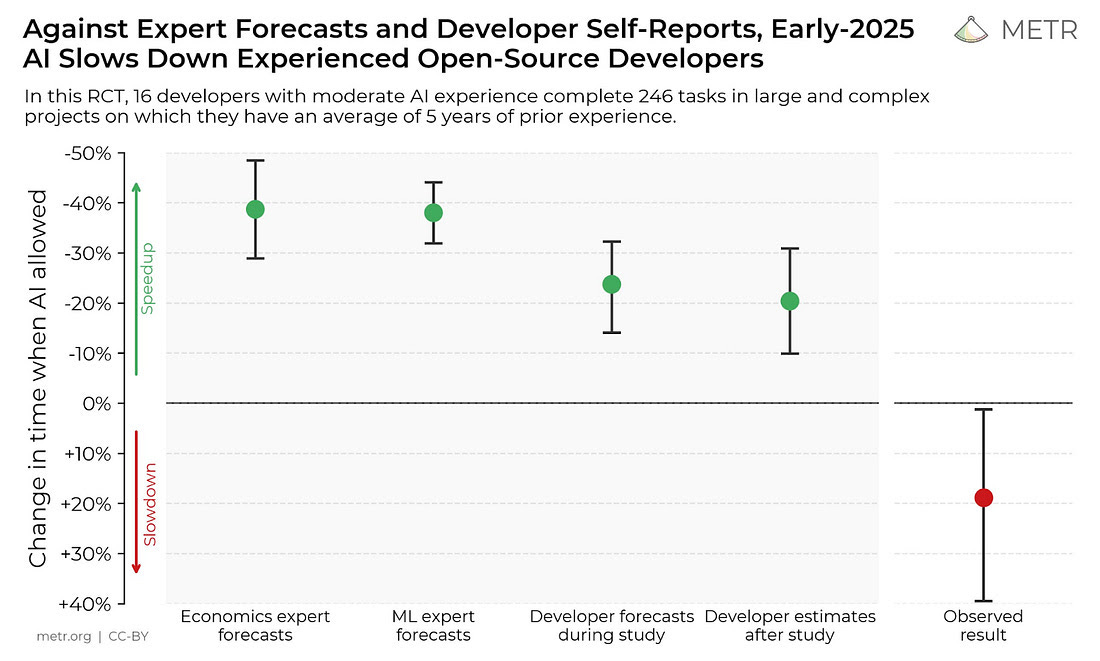20250810
“AI was supposed to save time. In software development, it might be doing the opposite. A new METR study found that experienced open-source developers using early-2025 AI tools (Cursor Pro with Claude 3.5 and 3.7) actually took 19% longer to complete tasks. Developers had expected a 24% speedup. Experts had predicted even more. In reality, AI added overhead when used in complex projects.” - on AzAz
People: Future proofing - what skills / voice? Dreams as data. Doing Things easy. The maintainers (PDF). Ryanair incentivizes finding oversized luggage. Futures of the CIA. Renting identities.
Tech: Waymo drove 100 million miles. Selling hacked data to debt collectors. Super resolution microscopes. Inerters. New TSMC plants. The Israeli art student. M2 self destructing SSD.
Security: KNP demise and weak password. Manchester arena attack analysis.
Planet: Wild within the walls. Visa integrity fee.
Futures: need for archetypes.
AI: and philosophy. AI finding bugs before they go prod. China goes full in on AI. Meta says no to EU code. Netflix and GenAI. NIH to cap applications numbers because .. of AI.
Is prompting managing. The great AI delusion.
DIY - lower power arduino. More on FHE.
En vacances sinon - ce post est programmé depuis quelques semaines ;)

Digital Cat and Mouse
Marcus had never intended to be a data savior, yet there he was, in the dimly lit corner of the office, grappling with an evil (and very poorly spelled) demand from a group both unknown and uninvited: the cyberpunks, or as they styled themselves, Akira. A ransomware attack had brought KNP, his transport company, to its knees, decrypting their vital operations with the ease of a child picking candy from a bowl. It wasn’t even personal; they just wanted some pocket change—£5 million, to be exact. Unfortunately, KNP, not famed for its financial prudence, could not muster more than a small stash of coin.*
Defeated by despair, Marcus leaned back and stared at his computer's swirling screen, where Big Sleep—the AI he had helped develop—was advising him on how best to negotiate with digital extortionists. “Just find a good vulnerability,” it chirped, its mechanical voice smoother than silk, “and wham bam! Penetrate their defenses.” He could almost hear the wink in its binary tone as he wondered if AI had a sense of humor.
Meanwhile, the world outside his office had blossomed into a unique hybrid of culture and commerce. Netflix had just released a sci-fi series using generative AI—El Eternauta they'd called it—showing how the digital could enhance the dynamic, while Ryanair was on the verge of rewarding employees for spotting oversized cabin bags with a small fortune.* Competition was becoming a ridiculous form of modern art, where the absurdity of the rules was only matched by the stories behind them. Marcus could only shake his head at the thought of being broke in a world where AI was spinning golden narratives.
As he realized this conundrum—the money puzzle amidst evolving technology—Marcus recalled the super-resolution microscopy that had allowed researchers to visualize proteins dancing in the dark recesses of living cells. He started contemplating what would happen if he could visualize the inner workings of Akira's demands, bringing their intricacies into sharper focus. What if he could exploit the gaps within their demands like someone making a homomorphic encryption of love notes in a spy thriller? An idea blossomed—if he could utilize his insights from his own experiences, while collaborating with brilliant minds, he might just create a counter-strategy more profound than a high school algebra exam.
Drawing from this unlikely revelation, he tapped into the skills required for survival in this new AI era: Collaboration and cunning, mixed with a sprinkle of creativity. After all, he mused, "savers save the day!" With a grin that rivaled the Cheshire Cat, he set to work, joining forces with an old professor, who had been lamenting the decline of critical thinking in the age of swift solutions via ChatGPT.*
Together, they crafted a plan, melding ethics with skill—a sort of “Prompting-Managing Impact Equivalence Principle”—to outsmart Akira. What came next was more exciting than any future archetype or corporate lawsuit over cabin baggage rules. They would hack the hackers, playing a game of digital cat and mouse that would draw upon all that was uniquely human, employing aesthetics and spontaneity as their weapons.
They made the decision to send a twisted version of a ransom note—a beautifully crafted piece reflecting both a challenge and an invitation to a chess match in cyberspace. The night was charged as they hit send, pooling data and dreams together; perhaps, in their brains and the digital ether, humanity could combat the encroaching coldness of automation.
And as they waited, Marcus couldn’t help but think: if AI was the future, then the future promised light-hearted mischief wrapped in layers of encoded hope. Or maybe he had just drank far too much coffee. Either way, as he chuckled to himself, there was a certain sweetness about turning the tables in a world where the absurd seemed all too often only a keystroke away.
*If you're wondering how a company like KNP could go from a vintage transport company to being taken by cyber-pirates, just remember: even the mightiest vessels can sink if plundered by naught but bad code and worse intentions.

